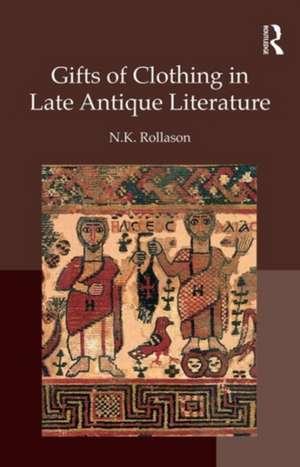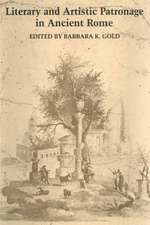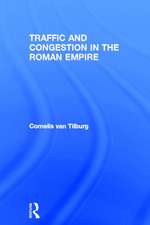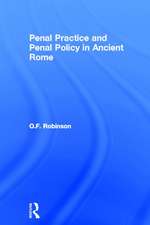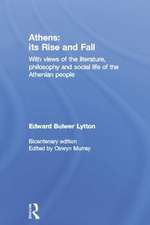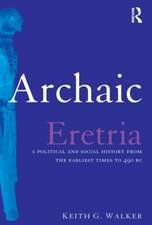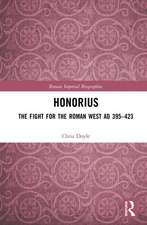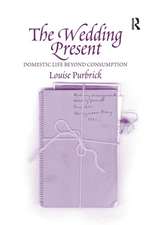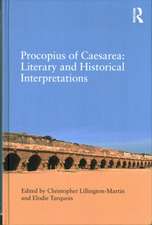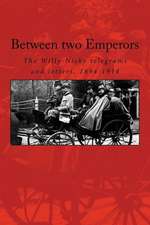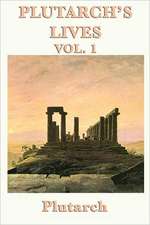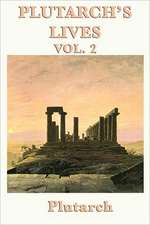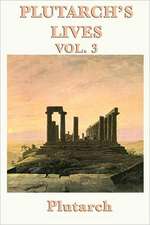Gifts of Clothing in Late Antique Literature
Autor Nikki Rollasonen Limba Engleză Hardback – aug 2016
| Toate formatele și edițiile | Preț | Express |
|---|---|---|
| Paperback (1) | 389.66 lei 6-8 săpt. | |
| Taylor & Francis – 12 dec 2019 | 389.66 lei 6-8 săpt. | |
| Hardback (1) | 847.31 lei 6-8 săpt. | |
| Taylor & Francis – aug 2016 | 847.31 lei 6-8 săpt. |
Preț: 847.31 lei
Preț vechi: 1140.21 lei
-26% Nou
Puncte Express: 1271
Preț estimativ în valută:
162.13€ • 169.63$ • 134.68£
162.13€ • 169.63$ • 134.68£
Carte tipărită la comandă
Livrare economică 02-16 aprilie
Preluare comenzi: 021 569.72.76
Specificații
ISBN-13: 9781472435736
ISBN-10: 1472435737
Pagini: 212
Dimensiuni: 156 x 234 x 18 mm
Greutate: 0.43 kg
Ediția:1
Editura: Taylor & Francis
Colecția Routledge
Locul publicării:Oxford, United Kingdom
ISBN-10: 1472435737
Pagini: 212
Dimensiuni: 156 x 234 x 18 mm
Greutate: 0.43 kg
Ediția:1
Editura: Taylor & Francis
Colecția Routledge
Locul publicării:Oxford, United Kingdom
Cuprins
Introduction / Threads of history: clothing gifts in Greek and Roman society before Late Antiquity / Weaving a tranquil work of peace? Clothing gifts in Late Antique diplomacy / Portable portraits: consular Trabeae and figural decorations in Late Antiquity / Holy habits: clothing gifts in Late Antique Christian contexts / Drawing the threads together / Conclusions / Bibliography / Index.
Notă biografică
N.K. Rollason studied at the University of Nottingham for her BA (Hons) in Classical Civilisation and MA in Ancient History. After a period of working in the public sector she completed her PhD in Classics at the University of Nottingham in 2013. Both during and after her doctoral studies she worked as a Teaching Affiliate at the university, in addition to convening a course in Medieval Latin for MA and undergraduate history students at Nottingham Trent University. She is currently an Honorary Research Fellow and a Teaching Associate in Classical Studies at the University of Nottingham.
Recenzii
"Rollason has produced a highly informative and readable book on the reality and literary representation of gifts of elite male clothing during the period from the fourth into the sixth century AD. It is a welcome addition to the bibliography on gift-giving and the symbolic use of clothing during this period, and will serve as an excellent starting point for any further studies of specific examples of such."
- David Woods, University College Cork, Ireland, in the Bryn Mawr Classical Review
"Rollason’s work is an important contribution to the maturing discipline of setting ancient dress-studies within a wider methodological interface."
- Lloyd Llewellyn-Jones, Cardiff University, UK
"It holds much that is of interest to students of late antique literature and society as well as those interested in the history of clothing more in general."
- Maurits Sterk de Leeuw, Tübingen
- David Woods, University College Cork, Ireland, in the Bryn Mawr Classical Review
"Rollason’s work is an important contribution to the maturing discipline of setting ancient dress-studies within a wider methodological interface."
- Lloyd Llewellyn-Jones, Cardiff University, UK
"It holds much that is of interest to students of late antique literature and society as well as those interested in the history of clothing more in general."
- Maurits Sterk de Leeuw, Tübingen
Descriere
Both clothing and gifts in the ancient world have been the subject of much scholarly discussion because they were an integral part of Greek and Roman society and identity. This book addresses a gap in scholarship by focusing on gifts of elite male clothing in late antique literature in order to show, that when they appeared in texts, these items were not only functioning in an historical or 'real-life' sphere but also as a literary space within which authors could discuss ideas of social relationships and authority.
